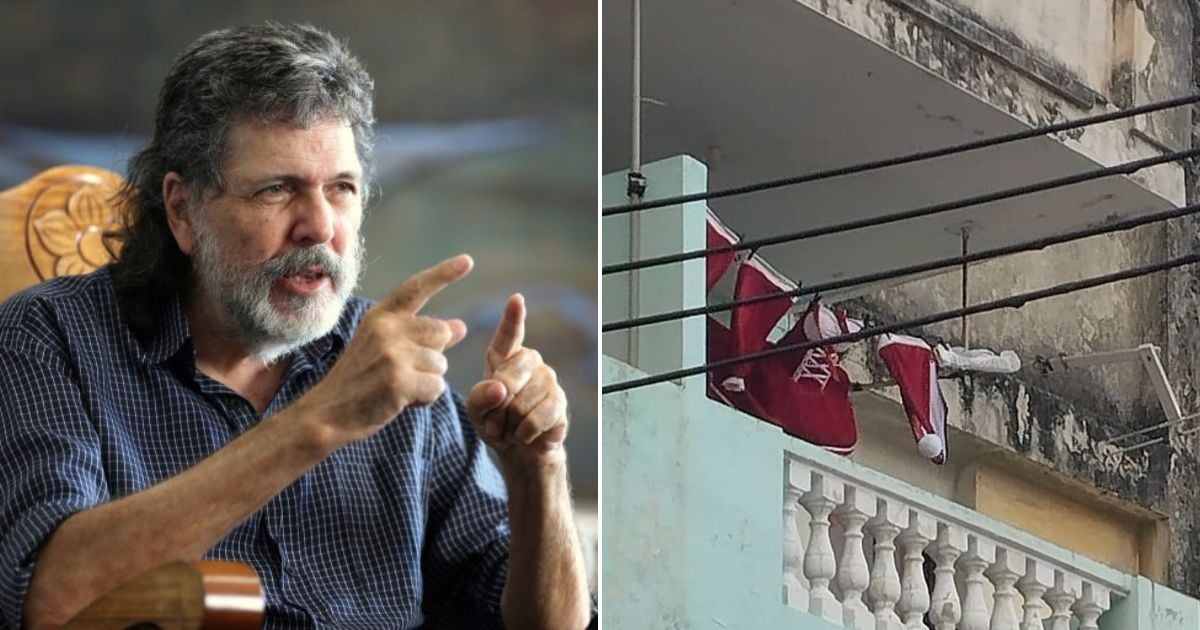
Related videos:
While the population is facing a severe economic crisis that has prevented many families from celebrating Christmas Eve, former Minister of Culture Abel Prieto Jiménez criticized the figure of Santa Claus this Tuesday, stating that his presence has taken hold as genuine Cuban symbols and traditions fade away.
The current president of Casa de las Américas and a prominent enforcer of the Ministry of Culture (MINCULT), who recently showed disdain for the LGTBIQ+ community, expressed on Facebook that “during this Christmas season, a friend sent me a photo of a Havana balcony, where Santa Claus has hung out to dry (after washing them) some boots and several hats from his collection.”
Prieto harshly criticized the figure of Santa Claus, pointing out that it is an influence that undermines local traditions. "This character has been settling among us and around the globe while authentic symbols and traditions fade away," he wrote, following the regime's historical trend of rejecting anything it deems an extension of capitalism.
His statements, misguided and disconnected from crucial issues such as the economic crisis, were met with rejection from the Cuban people, who highlighted the former minister's detachment from the real needs of the population.
In the comments section, Amarilys Fernández replied: "Seriously? What traditions are you talking about when not even Cubans will be able to eat a piece of pork? In the midst of such need and precariousness, not to mention darkness, you dare to say that? You might as well keep on sleeping, sir."
Cuban activist Yamilka Lafita, known on social media as Lara Crofs, responded emphatically on Facebook to the statements made by Abel Prieto.
In his response, he pointed out Prieto's disconnect from Cuban reality and his apparent rejection of changes in the citizens' customs: “Abelito doesn’t realize or wants to keep pretending that the desires and customs of Cubans have not changed.”
Additionally, he recalled how, in his childhood, anything related to Santa Claus was considered "ideological diversion," a label used by the government to condemn any action or idea seen as contrary to the interests of the Revolution.
"You could face a public repudiation, be expelled from your workplace or school, or even end up in prison," he stated, highlighting the persecution faced by those who dared to celebrate these traditions.
However, he highlighted the irony that it was the regime itself that, in order to obtain dollars, promoted the cultural exchange that allowed Santa Claus to arrive on the island: “Of course, Santa arrived in his sleigh with his ‘Ho Ho Ho’,” he added, emphasizing that now this character brings joy to Cuban children, even though the “Cuban Santas” have little to give.
On the other hand, he criticized the former Minister of Culture for speaking about traditions and authenticity when, in his opinion, "the authentic and the traditions on this island were annihilated in 1959, when another man with a beard came to ban everything that brought joy to Cuban families," referring to the regime established after the Revolution.
According to the activist, those policies eliminated not only Christmas celebrations but also any symbol of hope for Cuban families.
Finally, he questioned the moral authority of the oppressor to criticize Santa Claus in a context where the regime he represents has failed for decades: “One must have very little dignity, Abel Prieto, to criticize, at this point and after nearly 65 years of failed experiments, the old man with a beard and sleigh who, in his few and clandestine appearances, brings more happiness than an autocratic regime,” he stated, emphasizing that Santa, even as a legendary figure, distributes gifts and hope on an island where hope fades daily.
Frequently Asked Questions about Abel Prieto's Critique of Santa Claus and the Situation in Cuba
Why did Abel Prieto criticize the figure of Santa Claus?
Abel Prieto criticized Santa Claus, arguing that this character undermines authentic Cuban traditions, reflecting a tendency of the regime to reject influences seen as capitalist.
How have Cubans reacted to Abel Prieto's statements?
Abel Prieto's statements have faced backlash from Cubans, who believe he is disconnected from the country's reality and the genuine needs of the population amid the economic crisis. Comments on social media underline Prieto's disconnect from Cuban reality and his disregard for the changing desires and customs of the citizens.
What does Santa Claus symbolize for Cubans today?
For many Cubans, Santa Claus symbolizes a moment of joy and hope, especially for children, in a context where happiness is scarce due to economic and social difficulties. Despite the regime's criticisms, Santa Claus has been embraced as part of a cultural exchange that brings moments of happiness to the population.
What is Abel Prieto's relationship with the LGTBQ+ community?
Abel Prieto has faced criticism for his homophobic and transphobic comments, which have sparked controversy and backlash within the LGBTQ+ community. Despite acknowledging a mistake in his words, Prieto continues to adopt a dismissive tone towards the demands of the movement, which reinforces his image of being out of touch with the calls for diversity and inclusion.
Filed under: